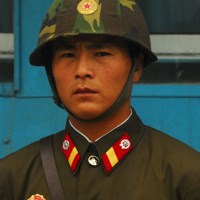Under North Korea's former dictator Kim Jong Il, crises followed a well-choreographed pattern. There would be provocation and sometimes outright aggression accompanied by paranoid, hostile and even hysterical rhetoric from Pyongyang. Eventually Kim would be mollified by some diplomatic concession or more assistance to keep the ramshackle North Korean economy from collapsing altogether, and things would return to normal -- such as it was. However much this game frustrated the United States, Washington was fairly confident that it would not escalate into accidental war. Kim knew how far to push and when to back off.
Unfortunately, the young Kim Jong Un is now attempting to emulate his father but in a much clumsier and more dangerous way. In part this is due to inexperience. Kim Jong Il was groomed for power over decades; Kim Jong Un was rushed into the position. But the stakes of the game are also greater for the younger Kim. Despite public fawning, it is likely that not all of North Korea’s powerful older military leaders have full confidence in his ability to sustain the country’s parasitic political system. Most likely, Kim is manipulating the current crisis to fend off domestic opposition. Having ratcheted up tensions, the North’s young leader can now claim that he stared America down, bolstering his claims that he is the rightful heir to the family business. As North Korea's official propaganda agency, which is often a window into official thinking, phrased it, the Democratic People’s Republic of Korea’s “resolute and merciless measure such as the declaration of its decision on nullifying the Armistice Agreement and its practical military action are shaking to the very foundation the hostile policy toward the DPRK by the U.S."
Knowing that Kim's attempt to stave off domestic opposition is likely behind the current crisis does not make the situation less dangerous. Given the insular world Kim inhabits, he may truly believe that he can intimidate the United States or South Korea at will. Unlike his father, Kim Jong Un may not know when to back off. This means that every time he plays the game, there is a chance of accidental war -- particularly if the United States and South Korea no longer prop him up with economic assistance. This is not the crisis kabuki Kim Jong Il so skillfully managed.

